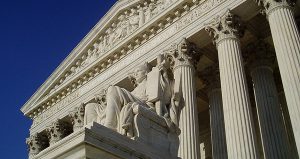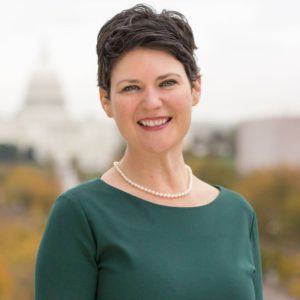Supreme Court upholds Trump’s travel ban
WASHINGTON (RNS)—The U.S. Supreme Court has upheld President Trump’s temporary ban on refugees and immigrants from a group of primarily Muslim-majority countries in a 5-4 decision, arguing it is within the executive branch’s power to “suspend entry of aliens into the United States.”
“The President has lawfully exercised the broad discretion granted to him … to suspend the entry of aliens into the United States,” the decision, written by Chief Justice John Roberts, reads, citing a statute in the United States code on inadmissible aliens.

“By its terms, (the statute) exudes deference to the President in every clause. It entrusts to the President the decisions whether and when to suspend entry, whose entry to suspend, for how long, and on what conditions. It thus vests the President with ‘ample power’ to impose entry restrictions in addition to those elsewhere enumerated in the (Immigration and Nationality Act).”
The decision, known as Trump v. Hawaii, spoke dismissively of the argument that the travel ban violates the Establishment Clause of the Constitution, which prohibits the government from establishing one religion: “Plaintiffs have not demonstrated a likelihood of success on the merits of their claim that the proclamation violates the Establishment Clause.”
Two dissents written
Four justices wrote two dissents to the decision. Justice Stephen Breyer, joined by Justice Elena Kagan, argued there is some evidence that exceptions to the ban are not being applied narrowly and show “anti-religious bias,” and would therefore “set the Proclamation aside.”
Justice Sonia Sotomayor, joined by Justice Ruth Bader Ginsburg, said review of the ban didn’t “cleanse (it) of the appearance of discrimination that the President’s words have created,” later adding, “Based on the evidence in the record, a reasonable observer would conclude that the Proclamation was motivated by anti-Muslim animus.”
Sotomayor also argued the ban violates the First Amendment to the Constitution, which guarantees religious liberty, saying, “The Court’s decision today fails to safeguard that fundamental principle.”
The court said it only considered the president’s executive order in making its decision, not Trump’s statements and tweets targeting Muslims, writing, “the issue before us is not whether to denounce the statements. It is instead the significance of those statements in reviewing a presidential directive, neutral on its face, addressing a matter within the core of executive responsibility.”
Widely varied reactions
The president was quick to celebrate the decision, tweeting, “SUPREME COURT UPHOLDS TRUMP TRAVEL BAN. Wow!”
Omar Jadwat, director of the American Civil Liberties Union’s Immigrants’ Rights Project, issued a scathing rebuke of the ruling.
“This ruling will go down in history as one of the Supreme Court’s great failures,” he said. “It repeats the mistakes of the Korematsu decision upholding Japanese-American imprisonment and swallows wholesale government lawyers’ flimsy national security excuse for the ban instead of taking seriously the president’s own explanation for his actions.”
Rachel Laser, president and CEO of Americans United, likewise criticized the decision.
“The Supreme Court today has forsaken one of our most foundational and cherished values—that our government must never single out any one religion for discrimination,” Laser said. “Our hearts break for the millions of Americans who, because of the Muslim ban, will continue to be separated from their loved ones and face peak rates of hate crimes and maltreatment.
“We refuse to be Americans divided. We are Americans united in the belief that people of all faiths, and with no religious affiliation too, all deserve equal treatment in America. We know well that when it comes to religious freedom, as Dr. Martin Luther King Jr. stated, ‘Whatever affects one directly affects all indirectly.’ We call on all Americans to rise up and repudiate the politics of fear, hate and division coming out of this administration.”
‘Straightforward win for President Trump’
Micah Schwartzman, a professor at the University of Virginia School of Law who specializes in the religious clauses of the U.S. Constitution, called the decision “a straightforward win for President Trump.”
“My read is that the 5-4 decision by the majority is a broader victory than many people expected,” he said. “Many thought the court would dodge this case—but it didn’t.”
Schwartzman, whom Sotomayor cites in her dissent, expressed frustration at what he described as the court “burying its head in the sand” by declining to consider Trump’s various negative comments about Islam.
“This was the big case: This was when the court was faced with clear religious animus coming from the president of the United States,” he said.
Schwartzman also argued there was a disconnect in the court’s approach to the ban compared with a recent Supreme Court ruling in Masterpiece Cakeshop v. Colorado Civil Rights Commission.
In that case, Justice Anthony Kennedy cited comments by CCRC officials supposedly deriding the religious beliefs of a baker who declined to make a cake for a same-sex wedding as evidence of anti-religious animus—something Schwartzman argued the court ignored in the travel ban decision.
“There is deep and profound inconsistency from the court between Masterpiece Cakeshop and this case,” he said. “The travel ban case casts Masterpiece under a deep cloud.”
Nelson Tebbe, professor at Cornell Law School, agreed.
“In the Cakeshop case, the court found that one or two statements by a multi-member board of officials sufficed to overturn its actions,” said Tebbe, who signed on to the same amicus brief as Schwartzman, in an email. “In the travel ban case, by contrast, overwhelming evidence of animus by a single decision maker, the president, was insufficient to overturn a policy with an obvious, discriminatory effect.”
Deluge of criticism
The travel ban has endured a near-constant deluge of criticism since then-candidate Donald Trump first proposed a “complete and total shutdown of Muslims” entering the country while campaigning for president in December 2015.
After he was elected, Trump signed an executive order instituting a more specific version of the idea on Jan. 27, 2017, banning refugees and migrants from seven Muslim-majority countries.
The order triggered widespread protests at airports across the country, and an unusually broad spectrum of faith groups—including the Council on American-Islamic Relations, National Association of Evangelicals, U.S. Conference of Catholic Bishops, Religious Action Center of Reform Judaism and the National Council of Churches—either rejected or outright condemned the ban.
Holly Hollman, general counsel of the Baptist Joint Committee for Religious Liberty, had joined 30 other legal scholars in a friend-of-the-court brief arguing the ban is unconstitutionally based in religious animus toward Muslims.

“We are deeply disappointed by the Supreme Court’s refusal to repudiate policy rooted in animus against Muslims,” said Amanda Tyler, executive director of the Baptist Joint Committee.
In giving such broad deference to President Trump, the court neglects its duty to uphold our First Amendment principles of religious liberty. Safeguarding religious liberty requires the government to remain neutral with regard to religion, neither favoring one religion over another nor preferring religion or irreligion.
“More than ever, preserving American religious freedom requires the active involvement of all citizens to denounce religious bigotry in all its forms.”
Legal challenges
The ban was beset by legal challenges. Within days, courts issued a nationwide temporary restraining order restricting enforcement of large parts of the ban. Trump subsequently signed a new version of the executive order that, among other things, removed Iraq from the list of countries affected by the ban.
That, too, was met with lawsuits: The United States District Court for the District of Hawaii issued yet another temporary restraining order in March 2017 that prevented the amended version from going into effect.
The debate made its way to the Supreme Court, which issued a decision on June 26, 2017, that reinstated parts of the order and set oral arguments on the case for later that year. But a third version of the ban, also signed in September, prompted the court to delay the arguments. A Hawaii judge halted this version in October.
Oral arguments in the case finally were offered before the court on April 25, 2018, with a wide swath of faith groups signing on to several amicus briefs siding with those condemning the ban.
The government defended the ban, arguing that the president has the authority to create immigration policy, that the ban itself doesn’t amount to a “Muslim ban” that discriminates unconstitutionally and that Trump’s comments about Islam during the campaign were “made by a private citizen before he takes the oath of office and before … (he) receives the advice of his cabinet.”
But the state of Hawaii disagreed on several counts, arguing that since Trump has refused to disavow his previous remarks about Islam—such as “I think Islam hates us”—those comments still paint the ban.
According to a 2017 poll from the Public Religion Research Institute, 55 percent of Americans oppose the ban, compared with 40 percent who approve. Among major religious groups, only white evangelical Protestants expressed majority support (61 percent) for the ban, compared with 48 percent of white Catholics, 42 percent of white mainline Protestants, 37 percent of Hispanic Catholics and 31 percent of religiously unaffiliated Americans. Only 24 percent of black Protestants expressed support for the ban.
With additional reporting by Managing Editor Ken Camp.